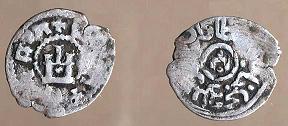 W
WAhmed bin Küchük was a Khan of the Great Horde between 1465 and 1481.
 W
WBerdi Beg was Khan of the Golden Horde from 1357 till 1359, succeeding his father Jani Beg of whom Berdi Beg may have been behind the poisoning.
 W
WJani Beg also called Djanibek Khan was a Khan of the Golden Horde from 1342 to 1357, succeeding his father Öz Beg Khan.
 W
WDawlat Berdi, also known as Devlet Berdi, was a Khan of the Golden Horde who reigned from 1419 to 1421, and again from 1428 to his death in 1432. He was the son of Jabbar Berdi and a descendant of Berke Khan.
 W
WBatu Khan, also known as Sain Khan and Tsar Batu, was a Mongol ruler and founder of the Golden Horde, a division of the Mongol Empire. Batu was a son of Jochi and grandson of Genghis Khan. His ulus was the chief state of the Golden Horde, which ruled Rus', Volga Bulgaria, Cumania, and the Caucasus for around 250 years, after also destroying the armies of Poland and Hungary. Batu or Bat literally means "firm" in the Mongolian language. After the deaths of Genghis Khan's sons, he became the most respected prince, called agha, in the Mongol Empire.
 W
WSultan Mohammed Öz Beg, better known as Uzbeg or Ozbeg, was the longest-reigning khan of the Golden Horde, under whose rule the state reached its zenith. He was succeeded by his son Jani Beg.
 W
WMengu-Timur or Möngke Temür (?–1280), son of Toqoqan Khan and Buka Ujin of Oirat and the grandson of Batu Khan. He was a khan of the Golden Horde, a division of the Mongol Empire in 1266–1280. His name literally means "Eternal Iron" in the Mongolian language.
 W
WNawruz Beg was a son of Jani Beg and Khan of the Blue Horde. He succeeded to the throne after murdering his brother Qulpa, though like his brothers, his reign lasted a year before he himself died; the cause of his death is unknown. Nawruz Beg's death precipitated the period of anarchy in which over twenty khans succeeded in the Horde or in various parts of the Horde, many of them concurrent, and having no real claim to the throne. Some of khans reigned only de jure; supreme military rulers ruled de facto; Mamai being the most capable and famous of these.
 W
WNogai, also called Nohai, Nokhai, Nogay, Noqai, Ngoche, Noche, Kara Nokhai, and Isa Nogai, was a general and de facto ruler of the Golden Horde and a great-great-grandson of Genghis Khan. His grandfather was Bo'al/Baul/Teval Khan, the 7th son of Jochi. Nogai Khan was also a notable convert to Islam.
 W
WQulpa was Khan of the Blue Horde from 1359 till 1360, after having deposed his brother Berdi Beg. Ruling for just a year, Qulpa was murdered by another brother Nawruz Beg in 1360.
 W
WTalabuga, Tulabuga, Talubuga or Telubuga was the khan of the Golden Horde, division of the Mongol Empire between 1287 and 1291. He was the son of Tartu and great-grandson of Batu Khan. He assumed the throne in the Golden Horde in 1287 with the help of Nogai Khan, but was dethroned four years later by the same, replaced by Tokhta.
 W
WTini Beg, also known as Tinybeg, was the khan of the Golden Horde from 1341 to 1342. He succeeded from his father Öz Beg Khan, and was then followed by his brother Jani Beg.
 W
WTokhtamysh, a prominent Khan of the Blue Horde, briefly unified the White Horde and Blue Horde subdivisions of the Golden Horde into a single state. He descended from Genghis Khan's grandson, Tuqa-Timur.
 W
WTokhta was a khan of the Golden Horde, son of Mengu-Timur and great grandson of Batu Khan.
 W
WTuda Mengu, also known as Tode Mongke, Tudamongke, was khan of the Golden Horde, division of the Mongol Empire from 1280 to 1287.
 W
WUlugh Muhammad (1405–1445; Urdu, Persian and Arabic: ألوغ محمد; Tatar: Oluğ Möxәmmәt; written as Ulanus by orientalists. A medieval tatar statesman, Gengisid, Khan of the Golden Horde, ruler of Crimea, and Khan of Kazan.